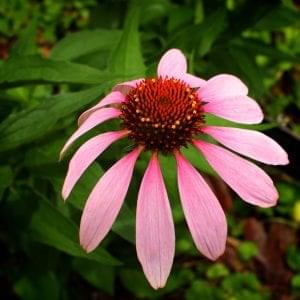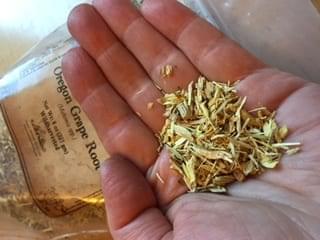The common cold is defined as a viral infection of the upper respiratory system. Stuffy noses, coughs and constant weariness are warning signs of an oncoming cold. There are over two hundred different types of rhino-viruses and since they travel through the air and via physical contact with ever benign objects such as doorknobs or light switches, these viruses are very successful. Although colds only last 2 weeks and host only mild symptoms, they can open the door to other more complicated bacterial infections like the flu, strep throat, or ear infections.
Herbal Allies for Prevention
Echinacea has a variety of forms and species to advantage of for virus defense. It is wise to combine different species such as Echinacea purpurea and Echinacea angustifolia since each offers a diversity of components that arm the body against viral attacks. The root has the the most medicinal value towards this purpose but the aerial parts including the flowers are excellent to add to teas or tinctures. Echinacea raises the white blood cell count in the body so it should not be taken before a blood test and doesn’t need to be taken more than a few weeks at a time.
Green Tea is rich in antioxidants which allows the body to defend itself against viruses. It is an easy herb to access and use. Organic green tea is best.
Astragulus is an well known immune system herb. Ayurvedic medicine has relied on it for centuries. Either teas or tinctures work well for daily fortification in winter. The taste is palatable and blends well with other herbs.
Garlic is a powerful herb that can be taken in capsules, soups, stews, oils or any other form that the patient finds convenient. The point is to get garlic in the body every day. It’s really that simple.
Reishi mushroom is not as popular as it should be. Mushrooms are growing in popularity due to new research on their effect on the body. Reishi mushroom actually tracks down viruses in the body and consumes them. Companies sell reishi in a large variety of forms – any will do.
Elderberry is one of the best herbs for kids. It is sweet, effective and easy on the body. It can be taken as a daily syrup that children will look forward to. Any herb that appeals to the sweet tooth and is effective against viruses is a good herb.
List of Herbal Allies for Prevention
- Echinacea species root
- Green Tea leaf
- Astragulus root
- Garlic bulb
- Reishi mushroom
- Elderberry fruit
Nutrition for Prevention
Although the temptation to eat more fatty foods during the colder months, fruits and vegetables contain essential vitamins that keep a cold at bay. The key elements to monitor is intake of vitamin C, beta-carotenes and zinc. Remember to eat a healthy diet with locally harversted foods, lots of water, adequate rest and outdoor exercise. Getting your daily dose of Vitamin D (preferably from sunlight) is key way of staying healthy in winter. Keep your house clean using antiseptic formulas like the Four Thieves Vinegar.
Herbal Allies for Treatment
Once a cold virus is in your system, it should only last a week to ten days. It is possible to reinfect yourself with the virus your body just battled or to pick up a completely different cold virus while your defenses are down so treatment with herbs is wise. Any of the herbs on the list of preventatives should be continued to help clear the body of the invading rhino-virus.
Fever is sometimes a side effect of the cold. Both fever and sinus congestion is alleviated by yarrow. Yarrow makes a wonderful steam that clears out the sinuses as well as a bitter tea for reducing fever. Ginger is a nice herb to combine with yarrow in tea form. A touch of honey and lemon or mint leaf helps this powerful medicine become more palatable. A more serious fever is best handled by meadowsweet or boneset.
Yarrow, sage, ginger and meadowsweet are best taken in tincture form to alleviate most symptoms of the cold. A tea of any combination of these four herbs does wonders for general aches and pains that go along with the stuffy nose and sore throat. Usually the throat is sore from coughing due to sinus drainage. Thyme tea does a fine job of soothing a sore throat.
Upset stomachs are no match for fennel. Even chewing a few fennel seeds calm unhappy tummies in no time. Licorice root has the same effect.. Applesauce is an easy treatment for discomfort of the digestive system. Stirring in a little ginger and cinnamon into plain applesauce doubles the effectiveness of this treatment. Try combining applesauce with healthy, plain yogurt to stabilize your probiotic levels. A little peppermint and chamomile tea does a fine job of settling upset stomachs too.
Annoying coughs can be broken into 2 categories: wet coughs and dry coughs. Wet coughs are “productive coughs” in that they produce mucus. Elecampane, marshmallow root, oregano and thyme are some of the soothing herbs for this symptom. Dry coughs are caused by scratchy throats. These are the coughs that subside with cough lozenges. Coltsfoot, wild cherry bark and horehound are favorite herbs for relaxing this symptom. Any of these herbs easily make a soothing cough syrup.
It is important to remember that each person reacts differently to different medicines sticking a reliable herb is often just a matter of knowing your own body. It is also important to remember that herbs will vary in strength from year to year for many reasons. The viruses will also vary. Remember that there are 200 of them. While one works against a virus one year may need another herb as a helper against a different virus.
List of Herbal Allies for Treatment
- Preventative herbs listed above
- Yarrow
- Ginger
- Meadowsweet
- Citrus
Nutrition for Treatment
Any doctor will tell you that getting rid of a cold means plenty of liquids, lots of rest, and vitamin C. Zinc is wonderful ally during cold season as well. Stick to food that is easy to digest like soup, juice and hot tea. Snuggle up under a blanket with a book. Limit TV time to a few movies. When the movie is done, turn off the TV, walk around, drink some water or go back to bed. Don’t forget the healing power of sunshine and fresh air.
Herbal Allies for Recovery
Recovery time from a cold is cleaning time. Viruses are patient. They can wait for new infection thresholds anywhere at home, work or school. Add a few drops tea tree essential oil or lavender essential oil to your wash bucket and dryer sheets for an antiseptic response. The bathroom is a wonderland for germs. Give everything a good wash down and change your towels. If you are not interested in throwing out that brand new toothbrush, rinse it daily in a cup of water with a drop or two of thyme essential oil. Thyme is noted for its antiseptic properties.
Go back to the list of preventative herbs and rework them into your diet. Recovery is not the time for Echinacea necessarily, but the other herbs will help you stay on your feet. Dandelion is an excellent herb to introduce for a few days during the recovery period. Try tossing a handful of sea salt and 1/4 cup of dandelion vinegar in your bathwater. It is surprisingly refreshing.
List of Herbal Allies for Recovery
- Thyme essential oil
- Tea Tree essential oil
- Dandelion
- Preventative herbs listed above except for Echinacea
Nutrition for Recovery
Revisit the preventative nutrition list. Slowly add a few more minutes of exercise and outside time. Eat fruits and vegetables that are colorful and full of flavonoids. Be good to yourself.
Remember to monitor your zinc intake in the winter. This is an easy supplement to add to any diet. Without zinc, the body feels run down and our resistance to impulsive snacking decreases. This is a slippery slope towards another illness.
Things to Avoid
Do not take antibiotics for a cold. The medication will only serve to weaken your immunity to potentially more serious infections.
Consider decreasing coffee, cigarettes or alcohol. This is not easy but neither is getting sick.
Further Resources
The Yoga Site offers poses to strengthen your immune system.
Healthy Eating Club provides the most complete list of foods that have Vitamin C (or not). Fruits and vegetables win again.







